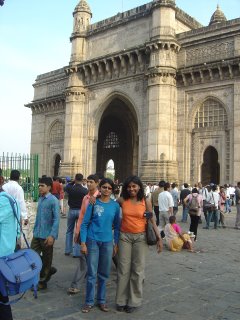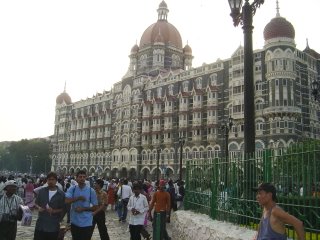India
I was in India until right before Thanksgiving. We're raising a fund that will be 'India centric' - it will invest in both Indian life science companies as well as Western companies with India as a key component of their business model. We were in Mumbai, at a conference and then meeting with various key influencers in the Indian life science community. Mumbai, formerly Bombay, is a pretty interesting city. It was created from 7 islands that were joined together in the mid-1800's to make one large island with the Arabian Sea as its western boundary and rivers and streams to the east and north. The ocean beaches are quite pretty and Mumbai was a major seaport during the time of the Raj.
Today, Mumbai is a typical hectic (kinder word than chaotic!) Indian city. Its 18 million people clog the arteries of a highway infrastructure that is incapable to handle that kind of traffic. Getting from the middle of the city to the end of the peninsula takes an hour or more if you go by car. There is a train line, but you wouldn't want to take it. Its cars are wall-to-wall people, standing packed as close as they can get; it is not uncommon that people hanging from the sides of cars fall to the tracks and are killed and injured. Just another day in Mumbai!
As in every Indian city, poverty is in your face. Women with tiny babies in their arms rap at your car window at stop lights, begging for change. If you were to offer any, your car would instantly be surrounded by by people spotting a mark, and you would be immobilized, annoying fellow passengers, your driver and other drivers. I resolve my white liberal guilt by writing checks to aid agencies when I get home, but it doesn't erase the pictures of the little babies and children from my mind.
Doing business here promises to be interesting. It is an absolute hive of industry and entrepreneurialism. Of course, everyone knows about the rise of the Indian IT industry, but life sciences is just in its infancy. Probably the most developed opportunities so far in life sciences are those which essentially entail a process outsourcing of clinical trials. He re in the US it is hard to recruit enough patients with the right profiles for a given trial. But in India the sheer size of the population, and also the need for healthcare, make it easier to fill studies quickly, thereby shortening the cycle time of a very long and costly process. Business people are energetic and smart - but lack access to capital and the venture model is not well-established. So we will have our challenges!
re in the US it is hard to recruit enough patients with the right profiles for a given trial. But in India the sheer size of the population, and also the need for healthcare, make it easier to fill studies quickly, thereby shortening the cycle time of a very long and costly process. Business people are energetic and smart - but lack access to capital and the venture model is not well-established. So we will have our challenges!
For reasons I won't go into, I stayed over the weekend so I could do business on Monday. Sunday was a down day, so my colleague Tania Fernandez and her sister Sonia, took me around the city and we did a little shopping. That's the two of them standing in front of the Gateway - Tania in orange and Sonia in blue. My favorite store was Fabindia, which sells fabrics, apparel and home linens for bed/bath and table. Other than silk scarves and wraps for gifts, I indulged myself in a pretty salwar kameez - a long tunic-like affair with slits on the side and baggy pants under, and worn with a beautiful long scarf called a dupatta.
We had tea at the beautiful Taj Hotel (in the picture below) and stopped at the Gateway of India (above), a monument built to commemorate the 1911 visit of King George V and Queen Mary of England.
India (above), a monument built to commemorate the 1911 visit of King George V and Queen Mary of England.
Home in time for Thanksgiving. I am giving thanks for getting to sleep in my own bed and to Delta Airlines, for opening the only Mumbai-to-JFK direct flight, which takes (only!) 16 hours. Way better than the alternatives, which take more like 20 when you add in transit time in Frankfurt, Paris or Heathrow.
Today, Mumbai is a typical hectic (kinder word than chaotic!) Indian city. Its 18 million people clog the arteries of a highway infrastructure that is incapable to handle that kind of traffic. Getting from the middle of the city to the end of the peninsula takes an hour or more if you go by car. There is a train line, but you wouldn't want to take it. Its cars are wall-to-wall people, standing packed as close as they can get; it is not uncommon that people hanging from the sides of cars fall to the tracks and are killed and injured. Just another day in Mumbai!
As in every Indian city, poverty is in your face. Women with tiny babies in their arms rap at your car window at stop lights, begging for change. If you were to offer any, your car would instantly be surrounded by by people spotting a mark, and you would be immobilized, annoying fellow passengers, your driver and other drivers. I resolve my white liberal guilt by writing checks to aid agencies when I get home, but it doesn't erase the pictures of the little babies and children from my mind.
Doing business here promises to be interesting. It is an absolute hive of industry and entrepreneurialism. Of course, everyone knows about the rise of the Indian IT industry, but life sciences is just in its infancy. Probably the most developed opportunities so far in life sciences are those which essentially entail a process outsourcing of clinical trials. He
 re in the US it is hard to recruit enough patients with the right profiles for a given trial. But in India the sheer size of the population, and also the need for healthcare, make it easier to fill studies quickly, thereby shortening the cycle time of a very long and costly process. Business people are energetic and smart - but lack access to capital and the venture model is not well-established. So we will have our challenges!
re in the US it is hard to recruit enough patients with the right profiles for a given trial. But in India the sheer size of the population, and also the need for healthcare, make it easier to fill studies quickly, thereby shortening the cycle time of a very long and costly process. Business people are energetic and smart - but lack access to capital and the venture model is not well-established. So we will have our challenges! For reasons I won't go into, I stayed over the weekend so I could do business on Monday. Sunday was a down day, so my colleague Tania Fernandez and her sister Sonia, took me around the city and we did a little shopping. That's the two of them standing in front of the Gateway - Tania in orange and Sonia in blue. My favorite store was Fabindia, which sells fabrics, apparel and home linens for bed/bath and table. Other than silk scarves and wraps for gifts, I indulged myself in a pretty salwar kameez - a long tunic-like affair with slits on the side and baggy pants under, and worn with a beautiful long scarf called a dupatta.
We had tea at the beautiful Taj Hotel (in the picture below) and stopped at the Gateway of
 India (above), a monument built to commemorate the 1911 visit of King George V and Queen Mary of England.
India (above), a monument built to commemorate the 1911 visit of King George V and Queen Mary of England. Home in time for Thanksgiving. I am giving thanks for getting to sleep in my own bed and to Delta Airlines, for opening the only Mumbai-to-JFK direct flight, which takes (only!) 16 hours. Way better than the alternatives, which take more like 20 when you add in transit time in Frankfurt, Paris or Heathrow.

<< Home